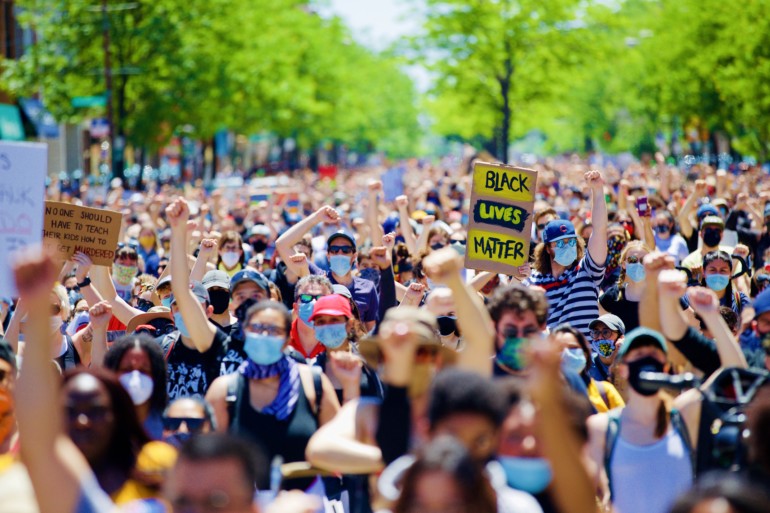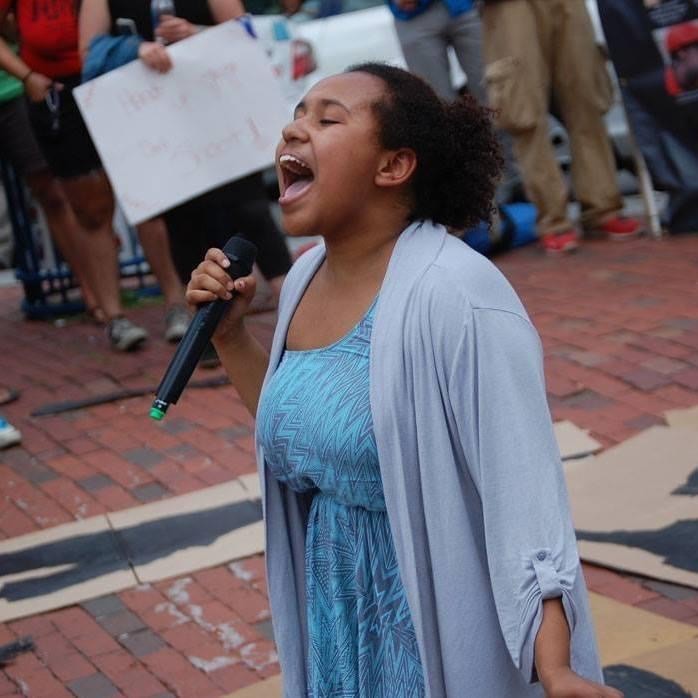Musician-turned-activist, Dom Brown, is one of the faces behind Chicago’s more than 30,000-person protest that took place Saturday, June 6. Over just four days, his organization, Activate: Chi, planned the city’s largest protest thus far.
“There are two types of protests,” Brown explains. “The ones that happen overnight, and the ones you work tirelessly and intentionally to organize.”
He, and about 19 other organizers from the Chicago area, worked 20 hour days leading up to the protest in order to ensure the safety of those attending. And it worked. The Chicago Police Department reported zero disturbances and zero arrests during the June 6 demonstrations. A very different scene than the protests just one week earlier in the Loop, which ended in Mayor Lori Lightfoot imposing a mandatory 9 p.m. curfew on the city (which has since been lifted).
Brown, who is 32, has always used his platform in Chicago’s music scene to give back to his community. But, it was the 2016 election of Donald Trump that he says, “woke something up inside of him”. It was never so clear to him how engrained racism was in the fabric of American society. He leveraged his influence as a member of Chicago-based DJ group Porn and Chicken, to mobilize people to vote.
He felt this same desperate need to take action, when he watched the public execution of George Floyd by police officers May 25, 2020.
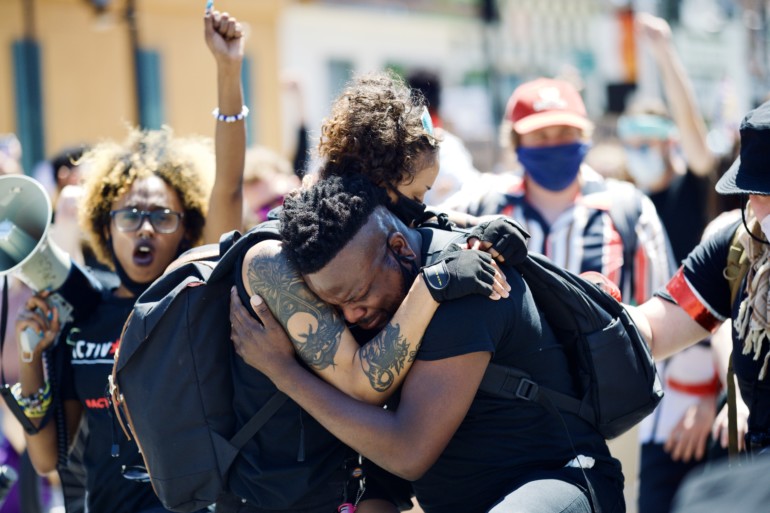
“If you don’t ever try, you won’t know what could’ve been accomplished,” Brown explains. He saw that there was a protest being organized in Humboldt Park by another local organizer, Kay Buzz, and the two began to collaborate. From inception, they emphasized the importance of wearing masks and taking proper COVID-19 health precautions.
Initially, the Facebook page for their protest had only 400 people marked as attending. But, as they began advertising and organizing, the number of people interested skyrocketed to 12,000. It was at that point, the Chicago Police Department intervened.
Brown and other organizers intentionally chose to plan the protest without the involvement of CPD. Many of Activate: Chi’s demands directly pertain to police brutality and they felt it would be incongruent to plan a protest with the support of CPD. These demands include the reallocating of CPD funds into education and other programs designed to support Black lives and futures, as well as the creation of a Civilian Police Accountability Council (CPAC).
Brown did choose to loop in Alderman Walter Burnett of Ward 27, who he had previously worked with when organizing music festivals. Alderman Burnett was also one of the speakers at the protest.
The Police Department contacted them out of concern that with 15,000 people planning on attending, it could be a National Security risk. CPD insisted that there must be police presence at Union Park, to which Brown agreed under the premise that they would not be in riot gear and that their presence be limited.
Riot gear refers to equipment worn by officers during civil demonstrations for extra protection. The exact outfit is determined based on perceived level of threat, but can include special helmets, shields and non-lethal weaponry, like tear gas and rubber bullets. While technically considered non-lethal, this weaponry has proved to be incredibly dangerous against unarmed protestors.
“Shockingly, they complied, and the protest was perfectly peaceful” Brown explains. “It shows [the police] can easily respect our demands, they just often choose not to.”
Activate: Chi also worked with marketing, legal, medical and logistical teams. They had medical tents with supplies, as well as trained medics walking around providing assistance to anyone who needed it. Their medical team was comprised of around 90 students and professionals, many of whom have specific experience in riot medicine.
The three-mile march began at 11 a.m. in Union Park and ended by mid-afternoon in a grassy field at Hudson Avenue and Oak Street, where the Cabrini Green public housing complex once stood. In one of the most powerful moments of the day, protestors heard testimony from young Black and brown Chicagoans. Activate: Chi intentionally chose to amplify the voices of Black and brown authors, poets, singers and young people whose pain needed to be not only spoken, but heard.
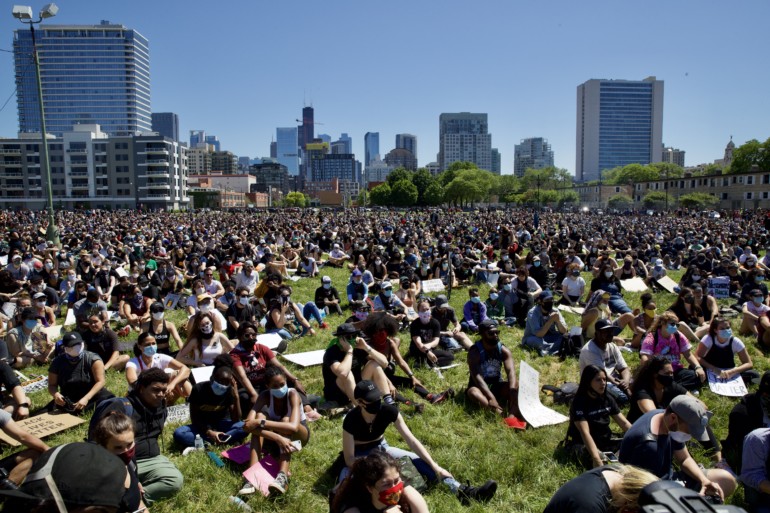
The speakers made specific calls to action for white folks not only to dismantle their own privilege, but to acknowledge the pain of their Black peers and commit to fighting for them. In an emotionally charged moment, one speaker asked white folks to turn to their Black peers and tell them they love them.
Brown concluded the speeches by encouraging protestors to make their voices heard by voting later this year.
*Edit: When this story was initially published, it included information about a protest planned for Sunday, June 28. That protest has since been cancelled. You can find more information on Activate: Chi’s Instagram page.
ACTIVATE: CHI is a collective of multicultural and multigenerational community organizers initially brought together by our hunger for justice in the brutal police killings of George Floyd, Breonna Taylor, and Tony McDade. We seek to dismantle the racist systems oppressing our marginalized communities through grassroots organizing.
Photos by Vashon Jordan Jr.
Voices of Change:
Here are just a few of the other young people making a big difference in Chicago.
Eva Maria Lewis
View this post on Instagram
A sociology major at the University of Pennsylvania, Eva Maria Lewis, 21, is changing the way young people organize in Chicago. Using her Instagram platform, she has been disseminating resources and information to her ever-growing following of 15,300 users. She began organizing in 2016, when she co-organized a massive youth march and subsequent sit-in to protest gun violence and police brutality in Chicago. Check out her organization, On the Ground Chi. Read more about Eva here.
Kaleb Autman
View this post on Instagram
Kaleb Autman, 18, is a recent graduate from George Westinghouse College Prep in East Garfield Park. He is also leveraging social media to reach young people in Chicago and beyond, mobilizing them to get involved with protests and clean-ups. He recently planned several clean-ups on Chicago’s West Side, giving his cohorts of volunteers the name “Westside Cleanup Crew”. Kaleb is very involved in Chicago’s organizing scene, follow along with him on social media to see how to get involved. Visit Kaleb’s website here.
Deborah Harris
View this post on Instagram
Deborah Harris is the executive director of Action Now, a community organization on the West Side that encourages residents to be more politically engaged. Her organization fights for the needs of community members, no matter what they may be. During COVID-19, they pivoted to providing direct services like groceries for seniors, PPE and rental assistance. After businesses on the West Side were looted following the murder of George Floyd, Deborah rallied her community together and provided food, diapers, school supplies and uplifting conversation to hundreds of residents.
Mari Gashaw
Mari Gashaw is going into her senior year at Northwestern University. She had a background in activism before coming to Evanston for college, having organized a 40,000 person protest in Boston, which is near her hometown. Since coming to Northwestern, she started the Black Mentorship Program, which is a peer mentorship program for Black first year students. She is heavily involved in organizing and uplifting Black students on campus and in the city of Chicago, and is the coordinator of For Members Only. Mari is also a co-founder of Dissenters at Northwestern, an organization working to end the military industrial complex. Learn more about Mari here.
Destiny Harris
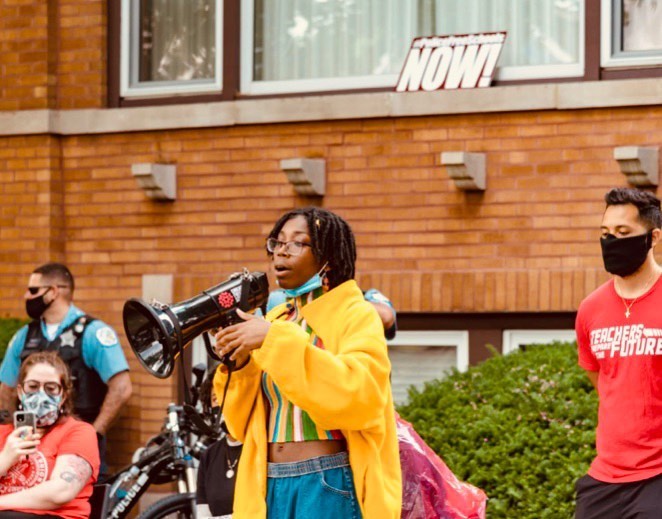
Destiny is a queer Black woman and poet from the Austin neighborhood, who organizes around the systemic issues that have plagued Chicago’s West Side for decades. She has been a part of the No Cop Academy movement and is a co-founder of Dissenters at Howard University. Recently, she has been organizing cleanups and food drives to support businesses and families impacted by COVID-19 and rioting. You can follow along with her on Instagram and learn more here.
More from Better:
- Juneteenth: A Brief History Lesson
- Better Together: Voices From the Community
- How to Help YWCA Evanston/North Shore Continue Their Equity Work at This Crucial Moment in Our History
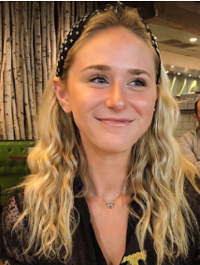 Madison Muller is the Assistant Digital Editor at Better. A recent graduate of Northwestern’s Medill School of Journalism, she approaches our contemporary media environment with compassion and candor. She is interested in writing about the intersectionality of social justice issues in marginalized communities and environmentalism. Madison proudly supports Action Now, a community organization that empowers and uplifts residents on Chicago’s West Side.
Madison Muller is the Assistant Digital Editor at Better. A recent graduate of Northwestern’s Medill School of Journalism, she approaches our contemporary media environment with compassion and candor. She is interested in writing about the intersectionality of social justice issues in marginalized communities and environmentalism. Madison proudly supports Action Now, a community organization that empowers and uplifts residents on Chicago’s West Side.
She also encourages reading and supporting the TRiiBE, a digital media platform reshaping the narrative of Black Chicago, and The Marshall Project, a non-profit news organization that seeks to create and sustain a sense of national urgency about the U.S. criminal justice system.
